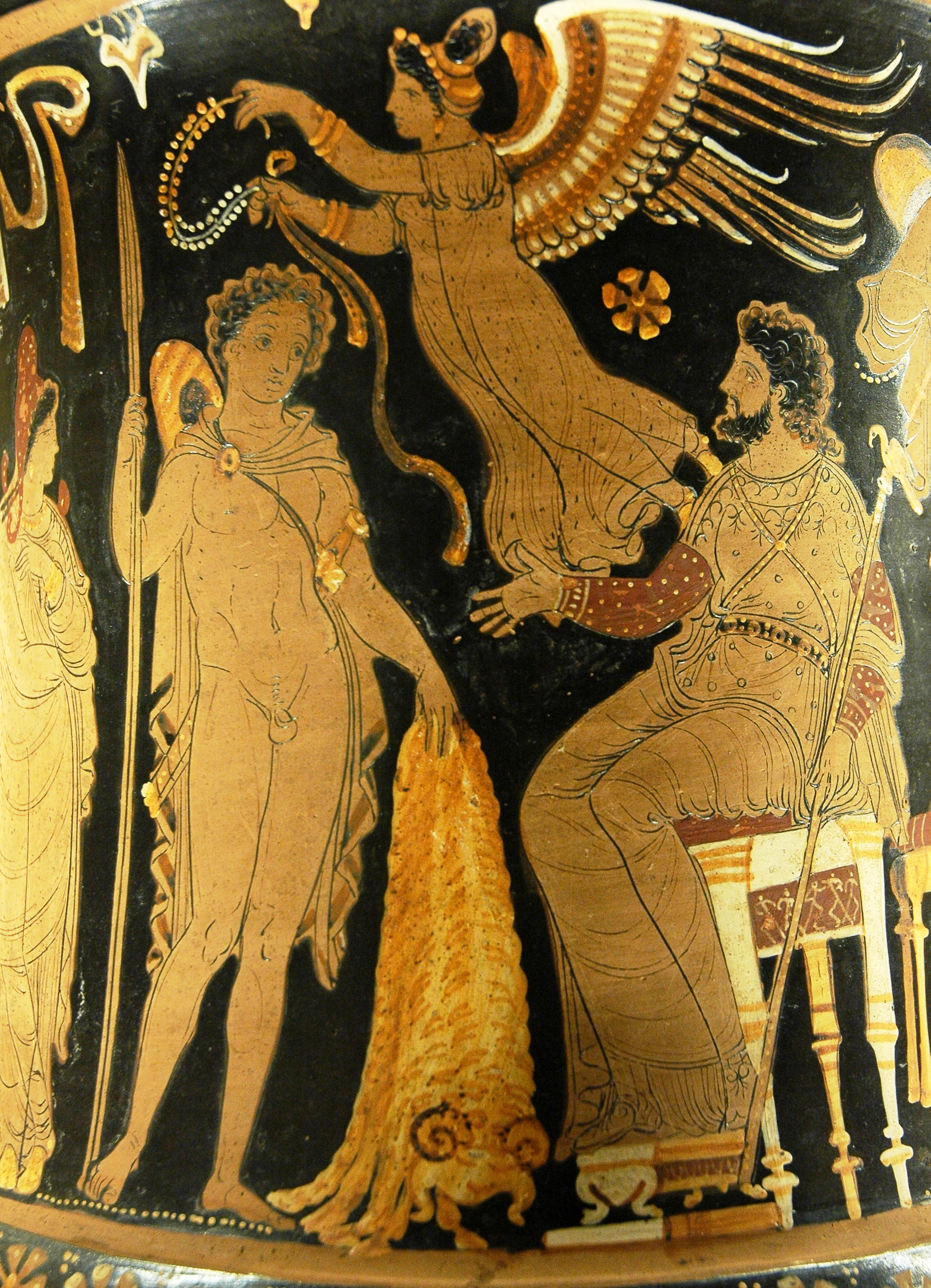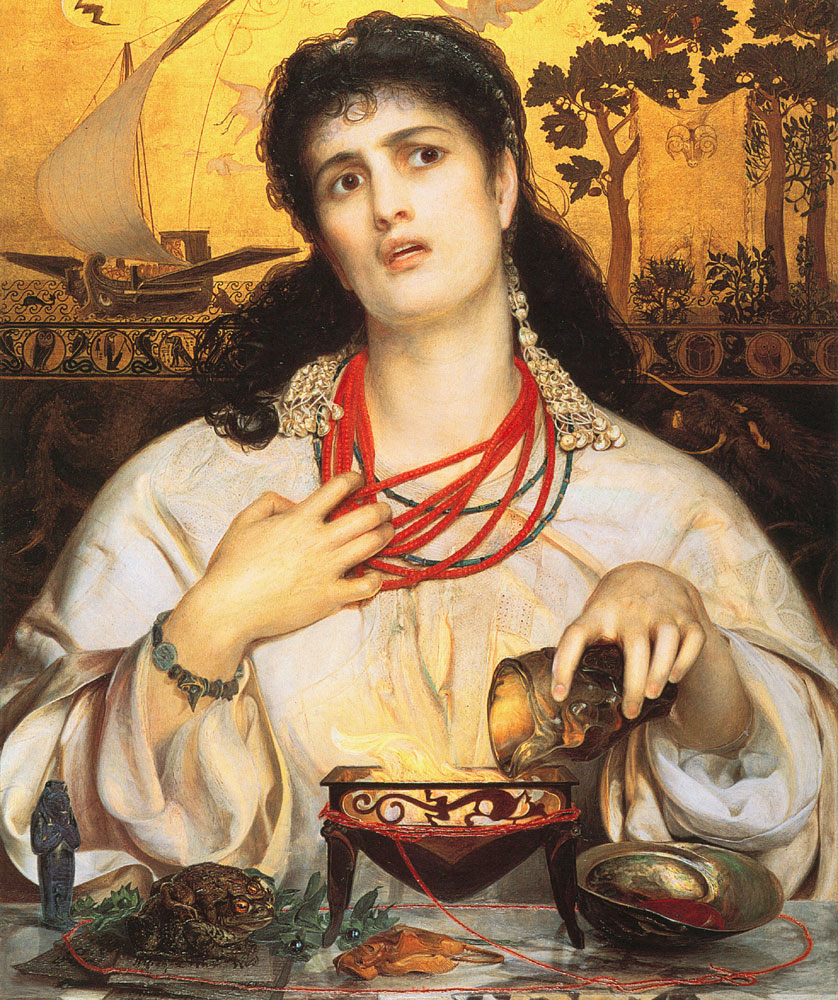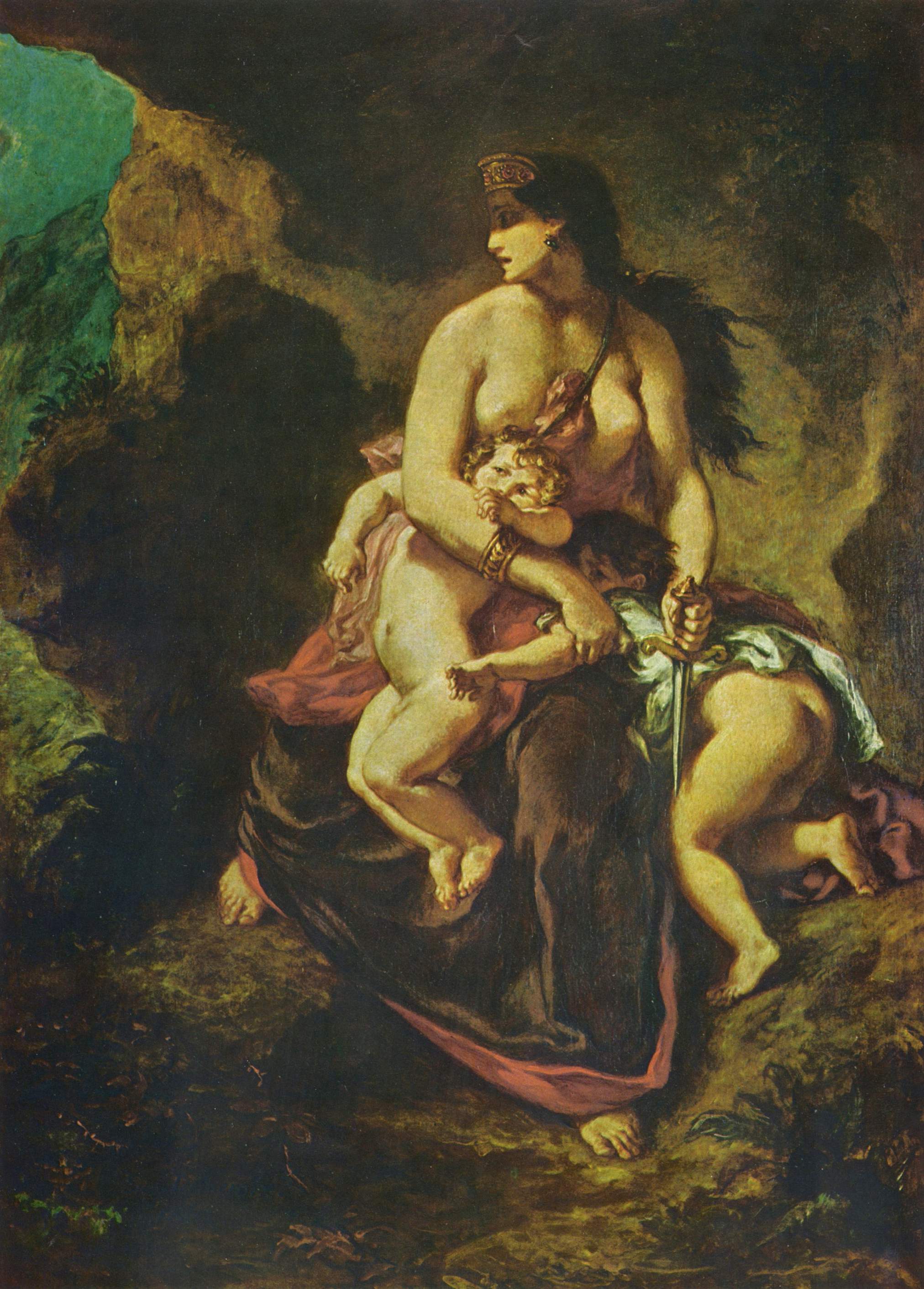
Erato and Clio, two of the nine Muse sisters (the ladies responsible for inspiring creativity and the arts), make frequent crossword appearances. Erato's name, which means "desired" or "lovely", shares its root with Eros (the god of sex -
you might better recognize his Roman appellations: Cupid and Amor. [Classic crossword clues: "Greek god of love", "Roman counterpart of Eros", etc etc. So write 'em down!]).It's fitting, then, that Erato be the Muse of erotic poetry (and just lyric poetry in general, but erotic poetry sounds so much more exciting).
 I always like Clio the best, though - she's the muse of history, which she must have gotten from her titaness mom, Mnemosyne, the deity of memory.
I always like Clio the best, though - she's the muse of history, which she must have gotten from her titaness mom, Mnemosyne, the deity of memory.Medea also shows up a lot -- best known, of course, as the protagonist of Euripedes' tragedy, Medea, (which he produced in 431 BC along with three other plays, winning him third prize at the City Dionysia festival that year-
-hang on a sec, there were theatre festivals in ancient Greece? Who knew?! Gonna have to look into that...
Ohhh duh, ok, obviously it was a part of that big religious festival honoring Dionysus...
(see, I always pictured that looking more like this...:
...but that must have been what they were doing on Mount Olympus or something.) In Athens, it worked more like this:
At some point Athenians rejected a statue of Dionysus and he gave the men some kind of genital disease. So, at the beginning of Spring for about 700 years, Athens would throw a week-long party to honor the god (and, more importantly, keep their genitals disease-free).
Day 1: Pompe and circumstance! In a massive parade called the pompe, Athenians from far and wide head up the Acropolis to the Theatre of Dionysus, bearing, amongst other things, the wooden statue of Dionysus, wine, bronze and wooden phalluses (natch), and, then comes my favorite: a cart pulling a giant phallus (where can I get that job?). After the procession, there are singing, flute-playing, and poetry competitions, followed by sacrificing bulls and a giant feast for all of Athens (who was doing the catering?!). As if that weren't enough, the feast gives way to another huge parade dedicated to carousing drunkenly through the streets (they really don't hold back at all, those Athenians)!
Day 2: In a ceremony known as the proagon, the three playwrights announce the titles of their plays and the judges are selected.
Days 3-5: On each of the days, one of the three playwrights performs his three tragedies and one satyr play.
Day 6: Five comedies are performed.
Day 7: Another parade. Winners are announced by the judges, and receive a wreath of ivy (can you imagine how pissy actors would be nowadays if they put on four plays in a day and just got a plant on their heads?).)
There's actually so much more to look into on this front, but we've really gotta press on - I haven't even finished telling you about Medea!
 SO, the super-abridged version of Medea's story is this:
SO, the super-abridged version of Medea's story is this:Jason is the rightful king of Iolcus (modern-day Volos), but in order to take the throne, he's charged with the task of producing the Golden Fleece (literally - the fleece of a golden winged ram; see image on left), which was in Colchis (modern-day Georgia). So Jason sets off (on his ship, the Argo - also popular in crosswords), and eventually lands in Colchis.
 Jason and Medea sail off with the fleece in tow and her father and her brother at their heels. Don't worry -- she manages to lose Dad and cut her brother into pieces, so that takes care of that. They eventually make it back to Iolcus, but the king still refuses to give Jason the throne. So Medea takes it upon herself to convince the king's two daughters she can make him young again if they chop him up (girlfriend has a passion for slicing and dicing). The girls believe her, do as instructed, and, go figure, there's no coming back for the king.
Jason and Medea sail off with the fleece in tow and her father and her brother at their heels. Don't worry -- she manages to lose Dad and cut her brother into pieces, so that takes care of that. They eventually make it back to Iolcus, but the king still refuses to give Jason the throne. So Medea takes it upon herself to convince the king's two daughters she can make him young again if they chop him up (girlfriend has a passion for slicing and dicing). The girls believe her, do as instructed, and, go figure, there's no coming back for the king.
 So, as far as Greek women, Erato, Clio, and Medea all tend to appear fairly frequently in crosswords. A less common one, though, is Arachne. She doesn't show up in a lot of Greco-Roman mythology - it isn't until Ovid shares her story in the sixth book of Metamorphoses that she becomes a household name (Medea's story is told in the seventh book).
So, as far as Greek women, Erato, Clio, and Medea all tend to appear fairly frequently in crosswords. A less common one, though, is Arachne. She doesn't show up in a lot of Greco-Roman mythology - it isn't until Ovid shares her story in the sixth book of Metamorphoses that she becomes a household name (Medea's story is told in the seventh book). Now I'm no Ovid, but here you go:
 Well, Athena doesn't like this at all, so, disguised as an old woman, she suggests to Arachne that she might want to tone down all her gloating. But Arachne holds her ground, and challenges the old woman to a weaving contest. At that, Athena removes her disguise and weaves the scene of her victory over Poseidon. Arachne shoots back with an impeccably woven tapestry depicting 21 different stories in which the gods tricked mortals by disguising themselves. Then Athena really loses it: she destroys the tapestry and attacks Arachne, demanding that the impertinent human bow before her. Arachne, too proud to submit to the goddess, elects to hang herself instead. Athena doesn't want Arachne to have the last word, though, so she turns the noose into a web and Arachne into a spider.
Well, Athena doesn't like this at all, so, disguised as an old woman, she suggests to Arachne that she might want to tone down all her gloating. But Arachne holds her ground, and challenges the old woman to a weaving contest. At that, Athena removes her disguise and weaves the scene of her victory over Poseidon. Arachne shoots back with an impeccably woven tapestry depicting 21 different stories in which the gods tricked mortals by disguising themselves. Then Athena really loses it: she destroys the tapestry and attacks Arachne, demanding that the impertinent human bow before her. Arachne, too proud to submit to the goddess, elects to hang herself instead. Athena doesn't want Arachne to have the last word, though, so she turns the noose into a web and Arachne into a spider. - The image on the above left is Gustave Doré's etching of Arachne for the Commedia. (In 2003, Grammy-winning Texan rock band The Mars Volta used the famous illustration for the cover of a live extended release album.)
- The image on the above left is Gustave Doré's etching of Arachne for the Commedia. (In 2003, Grammy-winning Texan rock band The Mars Volta used the famous illustration for the cover of a live extended release album.) - But the best part is that arachne became the Greek word for spider, and then that became the root for one of my most beloved taxonomical classes, the eight-legged invertebrates: Arachnida! Clearly Zeus didn't make Athena read Be Nice to Spiders as many times as my dad made me.
- But the best part is that arachne became the Greek word for spider, and then that became the root for one of my most beloved taxonomical classes, the eight-legged invertebrates: Arachnida! Clearly Zeus didn't make Athena read Be Nice to Spiders as many times as my dad made me. 





I have read so many articles or reviews concerning the blogger lovers but
ReplyDeletethis post is genuinely a fastidious paragraph, keep it up.
my weblog Http://Igbt.Sel.Eesc.Usp.Br
An outstanding share! I have just forwarded this onto
ReplyDeletea co-worker who was doing a little research on this. And he actually
bought me dinner due to the fact that I discovered it for him.
.. lol. So allow me to reword this.... Thanks for the meal!
! But yeah, thanks for spending the time to talk about
this topic here on your internet site.
my webpage; ford ranger